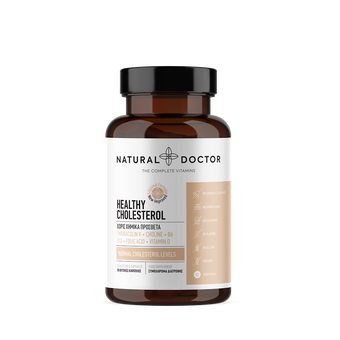Unlocking Heart Health: The Monacolin K Marvel in Red Yeast Rice

Managing cholesterol and homocysteine levels plays a pivotal role in the quest for optimal health. With the rise of cardiovascular diseases, individuals are increasingly shifting towards natural remedies and supplements to support cardiovascular health.
Among these, Red Yeast Rice, Choline, Vitamin D3, Vitamin B6, Folic Acid, and Vitamin B12 stand out for their potential benefits. Let's explore the science-backed advantages of incorporating these elements into your wellness regimen.
Red Yeast Rice (Monascus purpureus)
Red yeast rice is a traditional Chinese supplement that ferments rice with the Monascus purpureus yeast. It contains compounds known as monacolins, particularly monacolin K, which is identical chemically to the statin drug lovastatin.
Monacolin K works by inhibiting the activity of an enzyme called HMG-CoA reductase, a critical enzyme that participates in cholesterol synthesis in the liver.
By blocking this enzyme, monacolin K effectively reduces the production of cholesterol, mainly low-density lipoprotein (LDL) cholesterol, commonly known as "bad" cholesterol.
LDL cholesterol promotes atherosclerosis, characterized by the buildup of fat deposit in the arteries, leading to narrowed and hardened arteries. High levels of LDL cholesterol increase the risk of cardiovascular conditions such as heart attacks and strokes.
By lowering LDL cholesterol levels, monacolin K helps mitigate this risk, improving cardiovascular health. Moreover, monacolin K has been studied extensively for its efficacy in cholesterol management.
Clinical trials have shown its ability to lower LDL cholesterol levels significantly, often comparable to the effects of prescription statin medications. However, it's important to note that while monacolin K offers a natural alternative to statins, its potency can vary among red yeast rice supplements.
Therefore, choosing standardized products with known monacolin content is crucial to ensure reliable results.
In addition to its cholesterol-lowering effects, monacolin K may also exhibit antioxidant and anti-inflammatory properties, further supporting cardiovascular health.
By addressing multiple pathways implicated in cardiovascular disease development, monacolin K offers a comprehensive approach to cholesterol management.
Choline
Choline is an essential nutrient for various physiological processes, including lipid metabolism and neurotransmitter synthesis. Research suggests that choline plays a role in preventing the accumulation of triglycerides and cholesterol in the liver.
Adequate choline intake has been associated with lower total and LDL cholesterol levels, thereby reducing the risk of cardiovascular diseases. Moreover, choline is a precursor to the neurotransmitter acetylcholine, supporting cognitive function and overall brain health.
Vitamin D3
Often referred to as the "sunshine vitamin," Vitamin D3 is mainly known for its role in calcium absorption and bone health. However, emerging evidence suggests its involvement in modulating lipid metabolism and reducing inflammation, thereby influencing cholesterol levels.
Vitamin D receptors are in the cholesterol transport and synthesis cells, indicating its regulatory role in maintaining lipid homeostasis. Sufficient Vitamin D3 levels may contribute to optimal cholesterol profiles and cardiovascular health.
Vitamin B6, Folic Acid, and Vitamin B12
These B vitamins are integral to one-carbon metabolism, a biochemical pathway crucial for DNA synthesis and methylation reactions. Homocysteine, a sulfur-containing amino acid, is metabolized through this pathway, with deficiencies in B vitamins leading to its accumulation.
Elevated homocysteine levels are a symptom to an increased risk of cardiovascular diseases, including stroke and atherosclerosis. Supplementation with Vitamin B6, Folic Acid (Vitamin B9), and Vitamin B12 helps lower homocysteine levels, thereby reducing cardiovascular risk.
Incorporating natural supplements into your lifestyle can offer a holistic approach to managing cholesterol and homocysteine levels, critical determinants of cardiovascular health.



